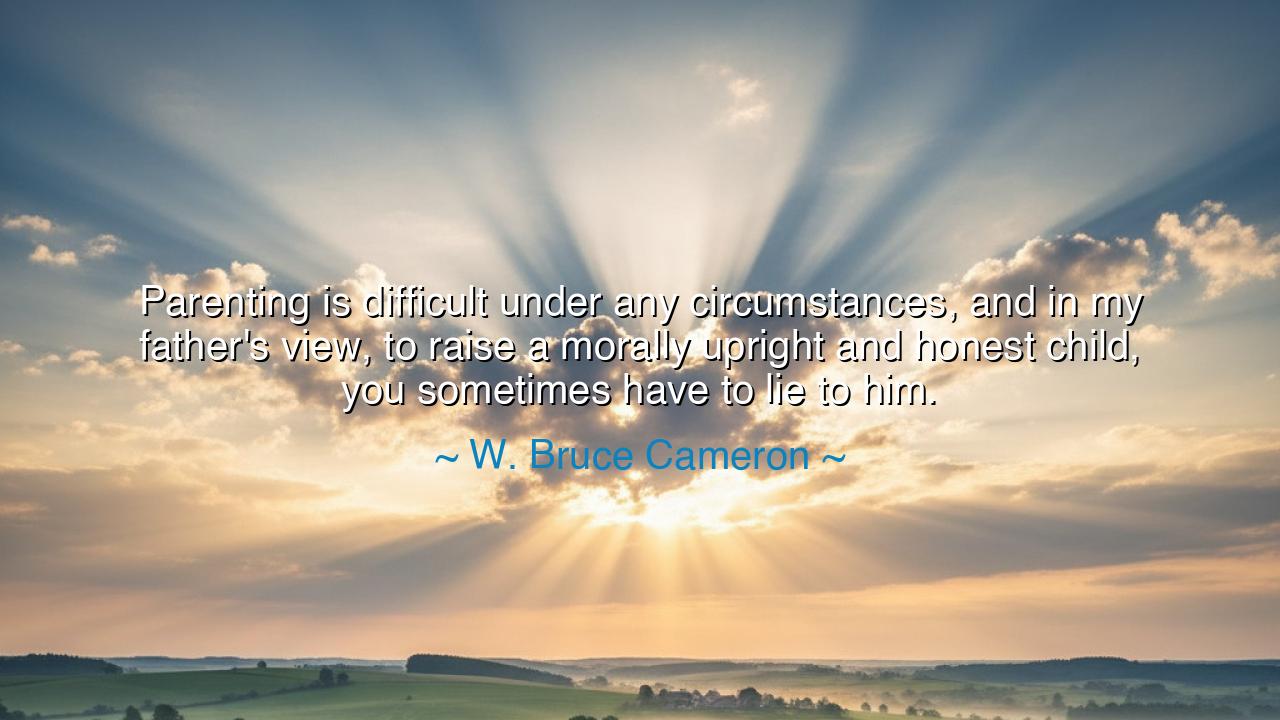
Parenting is difficult under any circumstances, and in my
Parenting is difficult under any circumstances, and in my father's view, to raise a morally upright and honest child, you sometimes have to lie to him.






Hearken, O seekers of wisdom, to the reflection of W. Bruce Cameron, who illuminates the labyrinthine path of parenting, where the shadows of intention and action intertwine. He speaks of a truth both delicate and profound: that to cultivate a morally upright and honest child, the guardian must sometimes wield a lie, not of malice, but of preservation. This paradox, at first bitter upon the tongue, reveals itself as a reflection of the eternal tension between truth and guidance, between the rawness of reality and the shaping of a tender heart. In the act of parenting, one must navigate this delicate balance, for the young soul is fragile and impressionable, and the world’s truths are sometimes too heavy for unseasoned hearts.
Consider the origin of this wisdom: Cameron draws upon his father’s view, a lineage of thought that spans generations. Ancient sages and storytellers alike have spoken of similar strategies. The fabled Aesop, through his fables, often obscured truths in story and allegory so that lessons of virtue, courage, and prudence might root themselves in young minds. The “lie” here is not a deception of selfish gain but a veil through which the child may encounter life’s truths at a pace they can bear. It is the scaffold upon which character is nurtured, the gentle guide that prevents the tender spirit from staggering under the weight of premature knowledge.
In the chronicles of history, we find echoes of this principle. Consider Abraham Lincoln, who as a boy was shielded from the full grief of mortality and the cruelty of man through stories softened by parental discretion. His mother, fearing the harshness of life too soon, presented a world tempered with simplicity, even if at moments veiled from stark reality. Yet within this protective shelter, Lincoln’s honesty and moral compass flourished, tempered by the wisdom of those who recognized that guidance sometimes requires a strategic veil. Here, we perceive Cameron’s father’s insight: the small, careful untruths can serve a higher truth in the cultivation of virtue.
Yet, let not this teaching be misread as advocacy for deception for convenience or gain. Cameron’s words speak to the arduous labor of parenting, a duty fraught with judgment and discernment. It is not the lie itself that is virtuous, but the purpose that girds it—the shaping of integrity, the fostering of courage, the nurturing of moral awareness. To lie without aim is to corrupt; to lie with the intent to guide is to cultivate the soul. In this, the ancient principle of the “noble end justifying a careful means” reveals itself, as applicable in the quiet hearth of the home as in the grand theater of the world.
The emotional weight of Cameron’s reflection is keenly felt. Parenting is difficult under any circumstances, he observes, for there is no map to perfection, no sacred formula that ensures the child will emerge pure and upright. There are nights of vigil, days of exhaustion, and choices that press upon the heart like the anvil of the smith. Each decision, whether to speak plainly or to veil, echoes in the corridors of a child’s developing conscience. Here lies the heroic aspect of parenting: the endurance, the courage to make choices not for ease, but for the sacred growth of another.
From this understanding emerges a practical lesson for all who guide the young. To raise a child with integrity, one must act with intentionality in all words and deeds. Sometimes, to preserve innocence, one may withhold a harsh truth or cloak it in gentle metaphor. Other times, one may allow experience to teach, but always with a mindful eye toward the shaping of conscience. The balance is delicate: truth and lie, knowledge and protection, freedom and guidance must be interwoven with careful hands. Here is the art of parenting as Cameron’s words reveal: a lifelong apprenticeship in wisdom, patience, and moral stewardship.
Let the listener reflect upon the practice of the ancients, who often taught through parable, myth, and ritual. The young were not bombarded with stark reality, but instead guided through stories imbued with lessons, allowing virtue to take root in safety. So too must modern guardians understand the strategic and compassionate employment of words, choosing those that nurture, guide, and fortify, even if they temporarily obscure. The lie, when wielded with love, becomes not a tool of deceit but an instrument of cultivation, a bridge to honesty and virtue that will one day stand strong in the child’s own moral architecture.
Thus, Cameron offers a timeless counsel: parenting is both arduous and noble, requiring wisdom to discern when to reveal and when to shield, when to speak and when to veil. The young must be guided with hands both firm and gentle, with words both honest and carefully tempered. From this, we gather our enduring lesson: the measure of a parent lies not in the rigid adherence to absolute truth alone, but in the careful shaping of the heart and conscience, ensuring that the child emerges from the tender years equipped with honesty, integrity, and moral courage to face the vast world beyond the hearth. In this delicate balance lies the eternal art of parenting, passed down from one generation to the next, as sacred as the stars that witness our toil.






AAdministratorAdministrator
Welcome, honored guests. Please leave a comment, we will respond soon